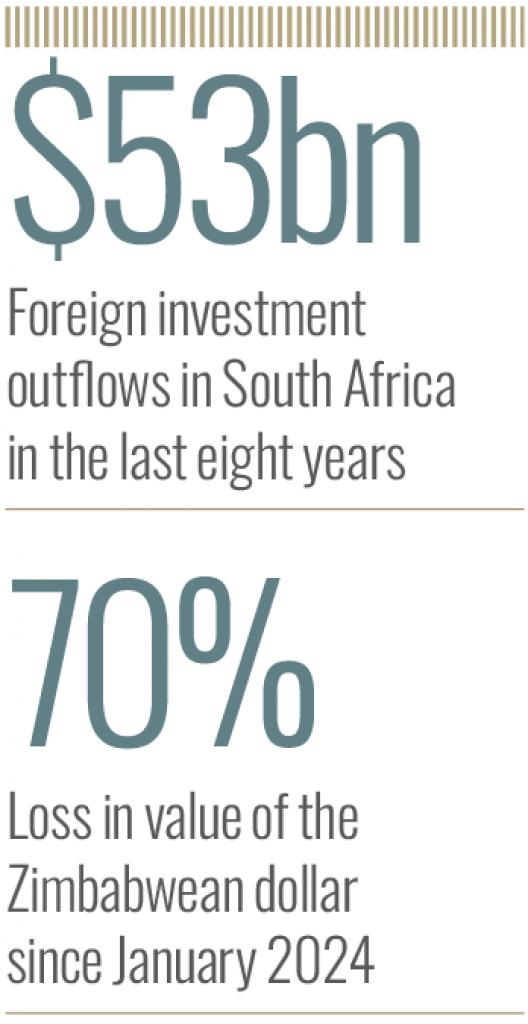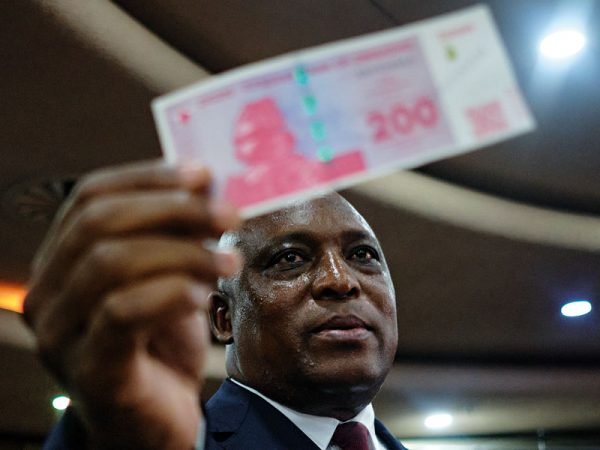
 
Author: John Muchira, Features Writer
In September 2023, Nigeria was upbeat after Emirates Airlines agreed to resume direct flights to the country. This came after an 11-month hiatus, the root cause of which was an inability to repatriate $85m in revenues trapped in the country due to a grievous currency crisis. Emirates was not alone in suspending operations. Etihad Airlines had done the same. Cumulatively, global carriers had a staggering $812m stuck in Nigeria when Emirates was suspending operations in November 2022, according to the International Air Transport Association.
The airlines’ fiasco is one case that was overly amplified. The reality is that Africa is a hotspot of suffering for multinationals. One major contributing factor is the currency crisis. Essentially, weak domestic currencies have made it difficult for foreign companies to repatriate revenues and profits. Worse still, they have battering effects on asset valuations of local subsidiaries. Instead of making a ruckus like Emirates, a majority of multinationals have opted to exit the continent silently. Many more are scaling down operations to minimise the losses.
“The high cost of doing business, red tape and a looming risk of devaluations reaching a critical mass is rendering operations in Africa unprofitable,” says Irmgard Erasmus, a senior financial economist at Oxford Economics.
Across Africa, the currency crisis is becoming endemic. The problem is profound in countries like South Africa, Nigeria, Egypt, Kenya, Ghana, Zambia, Ethiopia and Zimbabwe. In Egypt, for instance, the local pound has lost more than two-thirds of its value against the dollar since early 2022. Last year, Nigeria’s Naira was ranked among the worst-performing currencies in the world after depreciating by 49.4 percent.
In Zimbabwe, the local dollar has become a basket case. It has lost over 70 percent of its value on the official market since January this year. With businesses and traders shunning it in favour of US dollars, the Reserve Bank of Zimbabwe has reacted by launching a new currency called ZiG. It will be anchored on gold reserves and a basket of foreign currencies.
Out of Africa
The currency crisis has ignited widespread suffering and caused policymakers sleepless nights. For foreign companies, the impacts have been devastating. Many are finding it hard to bear the pain. When it exited Africa in 2021, UK’s financial conglomerate Atlas Mara cited currency volatility as a big factor in its decision. At the time, currency depreciations had caused a staggering $145m decline in the dollar value of its assets.
It has not been easy for most African countries to weather the storm of the global recession
Barclays Bank, Procter & Gamble, Glaxo-SmithKline, Cadbury, Eveready, Bayer, Nestle, Unilever have all also exited or significantly scaled down operations. Though other factors have been at play, weak currencies have been a common denominator.
It is not just multinationals that are feeling the pain. Institutional and individual investors in Africa’s capital markets, private equity firms and venture capitalists are also taking a beating. A case in point is South Africa. Johannesburg Stock Exchange data show that foreign investments outflows have amounted to $53bn over the past eight years. Last year, equities worth $8.3bn were dumped. In the Kenyan bourse, the exodus has been acute in recent times. The trend continued in the first quarter of this year with foreign investors selling $17m worth of stocks.
Repatriation of earnings is just one side of the problem for investors. Another that is more severe is substantial losses when weak domestic currencies are converted to hard currencies like dollars and pounds. “The exits and outflows showcase how powerfully foreign investors can react when their confidence is dented by a cratering currency,” states Jonathan Munemo, Economics professor at Salisbury University’s Perdue School of Business.
A combination of factors has conspired to inflame the currency crisis. The basics are an idiosyncratic component related to structural imbalances and external pressure in the form of tight global funding conditions and geopolitical risks. On the global stage, the aggressive rate hiking by the US Fed since March 2022 aimed at tackling stubbornly high inflation stands out. Its effect has been the value of the dollar rising substantially and exerting pressure on Africa’s currencies.
Turning up the heat
Surging global food and energy prices triggered by the war in Ukraine have amplified inflation pressures. Countries with high debt loads are also being forced to spend squeezed revenues on repaying expensive loans, heaping more pressure on currencies already weakened by depleted foreign exchange reserves. Currently, about 40 percent of public debt in the continent is external with over 60 percent of it being in US dollars.

Cases of countries with worsening debt burdens enduring intense exchange rate depreciations are ripe. Kenya offers a perfect example. With a public debt standing at $82bn, persistent fiscal deficits and dwindling reserves, the shilling reflected market concerns of a potential sovereign debt default on a $2bn Eurobond that matures in June 2024. Over the period between March 2022 and December 2023, the shilling weakened by 22 percent to the dollar. The freefall was more elevated at the beginning of this year. It was only arrested after the Kenyan government concluded a buyback operation of the maturing Eurobond.
“It has not been easy for most African countries to weather the storm of the global recession, monetary tightening and disruptions to global markets,” observes Christopher Adam, Professor of Development Economics at Oxford University.
While depreciations have battered the operations of foreign companies and investors, hysterical efforts by governments to stabilise domestic currencies have not made the situation any more bearable. Repatriation risks are most acute in countries relying on rigid forex regimes with currency convertibility issues also persisting in countries with flexible regimes. “Persistently high external financing needs tend to stand at the root of repatriation challenges,” explains Erasmus.
Across the continent, it has been a playbook of desperate measures to arrest the currency crisis. In Nigeria, the reform-minded administration of President Bola Ahmed Tinubu is implementing policies like unifying the multiple exchange rates and enabling market forces to set the exchange rate. The administration also intends to raise $10bn to boost forex liquidity.
Crippled by a prolonged economic crisis, Egypt is finally acknowledging that the path to economic transformation requires painful adjustments. The country has agreed to adopt a flexible exchange rate regime in line with International Monetary Fund demands in order to access an $8bn bailout. Beside the bailout, the country has also since secured an investment deal worth $35bn from the United Arab Emirates and mobilised $7bn and $6bn from the European Union and the World Bank respectively. Apart from helping stem a suffocating forex shortage, the war chest has enabled the country to float its currency, easing pressure on the pound.
The effects of policy interventions to tackle structural imbalances cutting across liquidity constraints, market distortions and lack of transparency in the forex market are somewhat yielding fruits. The Naira, for instance, has since taken a drastic turn in fortunes. In April, it was the world’s best-performing currency after gaining 12 percent against the dollar, building on a 14 percent surge in March, according to Goldman Sachs.
“Currency reforms will be welcomed by foreign investors and could spur capital inflows if they are successful in stabilising the exchange rate,” reckons Munemo.
A hard road ahead
A growing number of African countries are showing willingness to accommodate unpopular policies for long-term domestic currency stability. A few, like Ethiopia, are still clinging to a rigid forex regime. The net effect is subdued foreign interest in the government’s ambitious privatisation and sectoral liberalisation agenda. Despite its rigidity, the country is, however, dangling the carrot to ensure foreign direct investments keep flowing in. In September 2023 the National Bank of Ethiopia approved offshore accounts for strategic investors. Apart from making it easy for investors to manage their financial obligations, the directive also guarantees foreign currency convertibility for dividend repatriation and loan repayments.
Currency reforms will be welcomed by foreign investors and could spur capital inflows
“When restrictions are imposed in order to stabilise the exchange rates, private companies and individuals have the incentive to bypass official channels. This forms the basis of parallel or black markets in foreign exchange,” states Adam.
The parallel or black market continues to thrive in Africa. In some countries, it serves as the lifeline owing to the fact that it typically offers higher rates than the official exchange rate. Granted, the black market is a crucial component of the economy. Primarily, it offers a channel for individuals and businesses to access forex that may be scarce or overregulated in the official market. However, it also has damaging effects. For foreign investors who want to operate in stable, predictable and transparent environments, it can be a huge deterrent.
That deep entanglement with the dollar, and other hard currencies, has caused immense suffering for African countries, is indisputable. This explains why leaders in the continent led by Kenya’s William Ruto have been clamouring for de-dollarisation and development of homegrown local currency debt markets. The anti-dollar revolt is fuelled by popular consensus that advanced countries are often insensitive to how policies designed to provide stability in their own economies end up exporting currency instability to Africa. Additionally, if African countries borrowed more in their own currencies, they would escape the pains of exchange rate fluctuations spurred by rising global interest rates. The continent, however, understands that this is easier said than done.




















